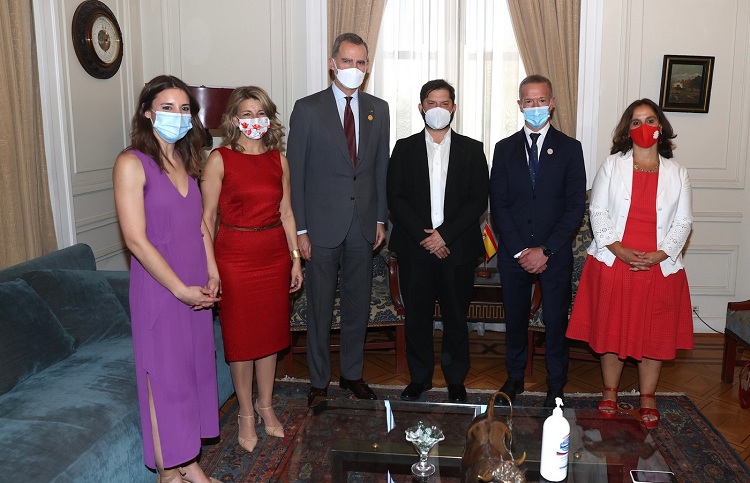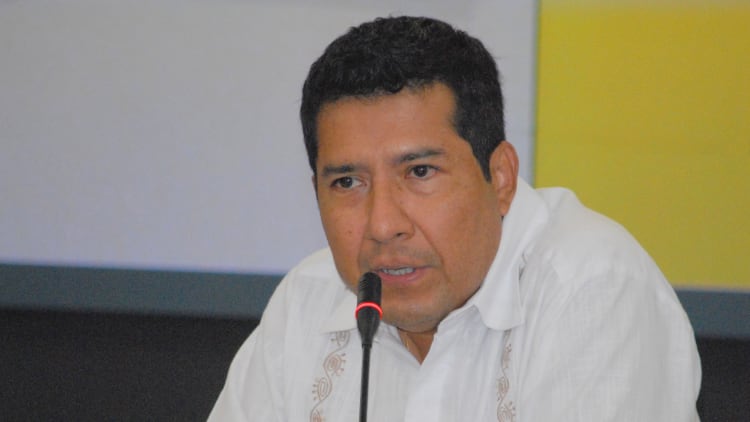The Diplomat
King Philip VI has been in Chile since yesterday to attend the investiture of the new president of the country, Gabriel Boric, with whom he already had a first meeting accompanied by the two ministers of Unidas Podemos who have traveled with him to the Andean country, the second vice president and Minister of Labor and Social Economy, Yolanda Diaz; and the Minister of Equality, Irene Montero.
The King arrived yesterday at Comodoro Arturo Merino Benitez International Airport, where he was received by the Spanish Ambassador to Chile, Rafael Garranzo, among other authorities. Afterwards, the Spanish delegation went to the City Hall of the Municipality of Santiago, where it held a meeting with the still elected president, Gabriel Boric, of the Social Convergence Party and elected for the period 2022-2026.
The meeting was attended, on the Spanish side, by the president of the Senate, Ander Gil, the vice-president Yolanda Díaz, the Minister of Equality (who has great political affinity with the new Chilean president) and the Spanish ambassador, while on the Chilean side, the appointed Minister of Foreign Affairs, Antonia Urrejola, was present.
Subsequently, the Spanish delegation accompanied the King in his meeting with the outgoing president of Chile, Sebastián Piñera, at the Palacio de la Moneda, and in his meeting with the Spanish community in Chile, at the Estadio Español de los Condes. Yolanda Díaz also accompanied the King at the honorary dinner offered by Piñera at the Palacio de la Moneda.
The King represents Spain at the inaugurations of Latin American presidents, a task that Don Felipe has been assuming since 1996 when he was still Prince of Asturias. This is the eighth participation of Philip VI in an inauguration of an Ibero-American president since he became King, since he was in 2018 in that of the Mexican Andrés Manuel López Obrador; in 2019 in that of the Panamanian Laurentino Cortizo; in 2020 in those of the Uruguayan Luis Lacalle Pou and the Bolivian Luis Arce; in 2021 in those of the Ecuadorian Guillermo Lasso Mendoza and the Peruvian Pedro Castillo; and in 2022 in that of the Honduran Xiomara Castro.
On the other hand, what is not so frequent is the presence of a Spanish delegation as large as the one that has traveled to Chile, with the two ministers and the president of the Senate. It is customary for the King to attend the inauguration of new heads of state in Latin America accompanied by the Minister of Foreign Affairs. However, the events in Ukraine have forced José Manuel Albares to suspend his presence at the Chilean presidential ceremony and to travel directly from Mexico to Madrid to receive this Friday his Estonian counterpart, Eva-Maria Liimets, which has allowed Yolanda Díaz to elevate her representative role and, therefore, further justify her presence in Chile.
The investiture ceremony, to be held today, will bring together many leaders of the Ibero-American left. Unidas Podemos expressed its satisfaction when Boric won in the second round of the elections against the right-wing José Antonio Kast. Yolanda Diaz published a video describing Boric as the “best possible project to widen democracy”, because he was the standard bearer of a candidacy that widened the left-wing space, in the style of the new broad project with the civil society that Diaz herself is trying to promote. For their part, both Irene Montero and the leader of the formation and Minister of Social Rights and Agenda 2030, Ione Belarra, wore T-shirts in support of Boric.
This will be the second occasion in which a member of Podemos in the Government accompanies the King in an inauguration of an Ibero-American president. In November 2020, the then first vice-president, Pablo Iglesias, attended the inauguration of the president of Bolivia, Luis Arce, who invited him in a personal capacity. The attendance of the then leader of Podemos was particularly controversial because he kept a parallel agenda during his stay in Bolivia, including the signing of the so-called Declaration of La Paz with several politicians of the Latin American left, including the Argentine president, Alberto Fernnández, Luis Arce, former presidents Evo Morales (Bolivia), Rafael Correa (Ecuador), Dilma Rousseff (Brazil), Alexis Tsipras (Greece) and former Prime Minister José Luis Rodríguez Zapatero.







